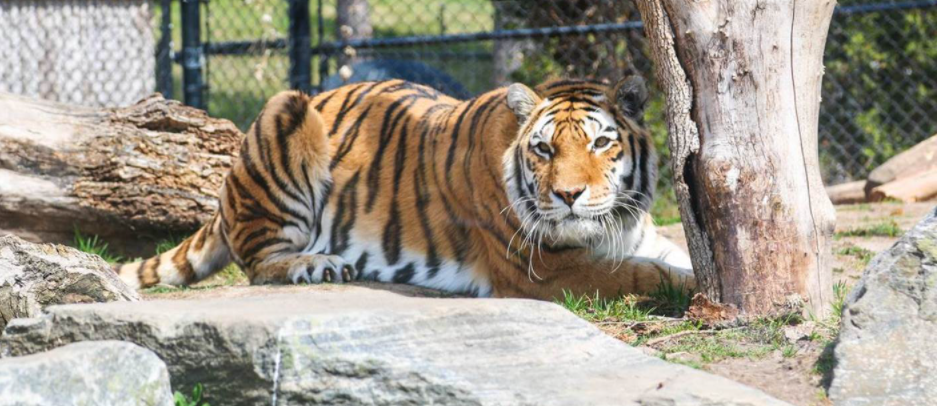
YOUR TORONTO ZOO ANNOUNCES HOPEFUL PREGNANCY OF ENDANGERED AMUR TIGER
FIRST AMUR TIGER PREGNANCY AT TORONTO ZOO IN 14 YEARS
If she is pregnant, her likely birthing window is April 20 – May 9. Her Wildlife Care team are preparing for various eventualities since Mazyria’s age is a large factor in the potential success - at nearly 14 years old, she would be one of the oldest Amur tigers to give birth in the Species Survival Plan (SSP) population. Females can produce litters up to about age 14; however, reproductive success declines significantly after age 7, particularly for reproductively inexperienced females. Hopefully, this will be Mazy’s second litter, with her first litter of three cubs being born in 2013 at Granby Zoo. Fun Fact – the father of Mazy’s first litter is Jack, an Amur tiger born at your Toronto Zoo in 2007 to Tatiana and Tonghua.
“While we are pleased to see the wild populations of these apex predators recovering, Amur tigers remain a great example of an endangered species that continues to need our help,” said Dolf DeJong, Chief Executive Officer of your Toronto Zoo. “Animals in human care remain an important insurance population safeguarding against extinction in the wild, raising awareness of their challenges and connecting with people to take conservation action. A new litter would be an incredible addition to our community and help us increase awareness of the species and the pressures they are facing.”
“Animal health and well-being is critical to reproductive success, particularly in older females. This pregnancy is the result of many years of dedicated collaboration amongst our entire Toronto Zoo team and is something to celebrate,” said Dr. Gabriela Mastromonaco, Toronto Zoo Director of Conservation Science.
“The pairing of Vasili and Mazyria was part of an Amur Tiger Species Survival Plan (SSP) recommendation,” said Brent Huffman, Lead Keeper of Mammals, Toronto Zoo. “The Amur Tiger SSP ensures the ongoing genetic health of the Amur tiger population in human care, safeguarding genetic diversity that may have been lost in the wild during the 20th century.”
The SSP Program oversees population management within Association of Zoos and Aquariums (AZA) member institutions and coordinates the Tiger Conservation Campaign, linking zoo tigers with their wild counterparts. Today the zoo population of Amur tigers represents a gene pool that could serve as a healthy supplement if population reinforcements become necessary in the future.
Introductions between Vasili and Mazy in winter of 2019-2020 did not result in successful breeding, but the Wildlife Care team was determined to try one last time in 2020-2021 before Mazyria reached the end of her reproductive lifespan. Due to the uncertainties in her ability to conceive at her age, the Toronto Zoo’s Reproductive Sciences branch began tracking Mazy's reproductive cycles using fecal hormone analysis in the fall of 2020. When behavioural signs of mating receptivity were seen, which included sniffing, chuffing or vocalizing and flirtatious advances and retreats by Mazy, Wildlife Care staff cautiously introduced Mazy and Vasili – an inexperienced male.
Vasili was unsure at first and it took several introduction attempts before breeding was observed on January 17, 2021. Elevated progesterone (pregnancy hormone) levels were confirmed on January 26, 2021, indicating that breeding had been successful. A follow-up analysis on April 14, 2021 showed an on-going elevation in progesterone levels that suggests Mazyria is expecting cubs and is not experiencing a pseudopregnancy. Wildlife Care staff are continuing to collect fecal samples multiple times per week throughout her pregnancy in order to add to the global dataset of hormone levels in pregnant and post-partum Amur tigers.
In 2007, the conservation status of Amur tigers was downgraded from Critically Endangered to Endangered by the International Union for Conservation and Nature (IUCN). Fewer than 500 Amur tigers can be found in the wild, slowly recovering from a low of just 20-30 animals in the 1930s. Illegal hunting and habitat loss are their primary threats. As part of the AZA Amur Tiger SSP, your Toronto Zoo has raised 20 Amur tiger cubs since 1974, with this upcoming birth being the first litter of cubs since 2007.
-30-
Media Contact Information:
Katie Gray
Toronto Zoo’s Manager of Strategic Communications
(416) 938-5283
[email protected]
Amanda Chambers
Toronto Zoo’s Supervisor of Strategic Communications
(416) 392-5974
[email protected]






For general information visit torontozoo.com
The Toronto Zoo’s mission is to connect people, animals and conservation science to fight extinction and our vision is a world where wildlife and wild spaces thrive.
An iconic tourist attraction and Conservation organization, the Toronto Zoo boasts a number of leading programs for helping wildlife and their natural habitats – from species reintroduction to reproductive research. A world-class educational centre for people of all ages, the Toronto Zoo is open every day including December 25 and attracts approximately 1.2 million guests each year.
Toronto Zoo is accredited by Canada's Accredited Zoos and Aquariums (CAZA) and the Association of Zoos and Aquariums (AZA). The Zoo has also achieved the Canadian Council on Animal Care (CCAC) Certificate of Good Animal Practice® and is inspected by the Ontario Ministry of Agriculture, Food and Rural Affairs (OMAFRA).
Toronto Zoo, 361A Old Finch Ave, Toronto ON, M1B 5K7
To unsubscribe, please send your request to [email protected].
View Toronto Zoo’s Privacy Statement